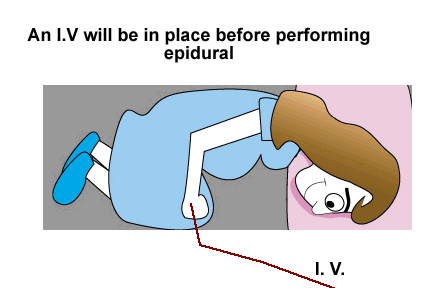Procedure of epidural placement for pain relief during childbirth

You will be asked either to lie on your side or sit up and curl your back out as much as you can as shown in the preceding images in the section ‘How do I position for epidural’. The anesthesiologist will feel bony landmarks in the lower back and will clean your back with an antiseptic solution prior to placing the epidural. A small amount of local anesthetic will be injected to numb your skin prior to insertion of the hollow epidural needle. After the needle is advanced to the epidural space, a tiny catheter (plastic tube) is inserted through the needle into the epidural space. Occasionally, some women may complain of ‘very transient’ tingling nerve sensation (parasthesia) of legs when the catheter brushes against the nerves in the epidural space during its passage. However, this is very transient and passes off very quickly. Once the catheter is in place, the needle is removed, and the catheter is taped onto your back. Initial medication is injected through the catheter. Some women report ‘feeling cold sensation in the back while medications are being injected’. Thereafter, the medication is delivered via an automated pump until your baby is born. Since the nerves from the uterus and cervix pass through the epidural space, as explained earlier, the medication bathes these nerves and blocks the sensation of pain.
The epidural can take 15-20 minutes to place, and the medication works gradually in the epidural space over next 15-20 minutes. Initially, many women notice that their pain during contractions is less intense and lasts for a shorter duration, until eventually, all they feel is the tightening feel (little pressure) of the contraction. You may not feel the contractions at all; it differs for every woman.
What happens after epidural placement
